6 Leaking Basement Floor Causes & Solutions
Author: Omar Alonso | Editor: Omar Alonso
Review & Research: Jen Worst & Chris Miller
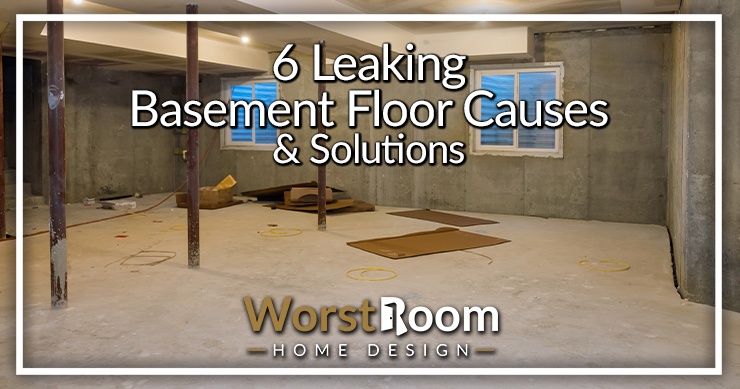
Did you go down into the basement after a heavy rain storm to find water pooling on the floor? It's an unfortunate occurrence and requires immediate attention. But why do I have a leaking basement floor? What's the cause of the problem, and how do you fix it?
If you have a concrete basement floor and there are cracks in it, water will find its way up through the cracks as the water table in the soil rises. It's common for this problem to occur after the snow melts in the spring or you have a heavy rainstorm during the summer.
That pool of water on the basement floor is a telltale sign that the floor is compromised and needs waterproofing and repair.
Why Do I Have a Leaking Basement Floor?
As mentioned, the main reason for the problem is the increase in the water table in the soil under the basement and around your house. If it rains for a few days, the water seeps into the ground, and the earth holds on to as much as possible. If the environment becomes waterlogged, there's too much water in the soil, and the ground around your yard turns into mud.
If you have a cracked garage or basement floor, you allow the water to rise through the crack and pool on the basement floor. The water might cause the crack by exerting pressure on the surface until it gives.
It's common to find leaking basements in older homes that don't have a weeping tile installed. If the basement wasn't waterproofed correctly, nothing stops the water from rising through the crack. Along with the floor, the basement walls can suffer the same problem, sustaining cracks that lead to leaks.
Top Reasons for a Leaking Basement Floor
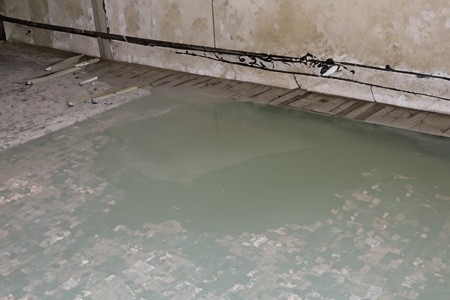
Here are the most common reasons you're finding water on your basement floor.
Poor Foundation Grading
The grading of the area around the house can lead to an accumulation of hydrostatic pressure, resulting in a cracked basement floor that leaks. The grade depends on municipal rules. However, over time, it can shift. This can happen in unfinished and finished basements alike.
The ground around your home should slope away from the structure and foundation to give the water somewhere to run away. If your drain spouts aren't positioned properly away from the house, they can cause problems with drainage and water pooling around the walls and foundations. No matter the foundation types, watch for these issues.
No Weeping Tiles
The weeping tile or drain tile is an underground pipe gathering water in the soil around the walls and foundation, redirecting it to another area. The weeping tile can divert the water flow to the sump pit, sewer, or out into the yard.
The drain tile redirects the water accumulating around the home, moving it to another location on the property. If your home doesn't have a weeping tile, the water in the soil steadily accumulates, placing pressure on the walls. Eventually, this pressure causes issues, such as a leaking window well or a leak in the basement.
Cracks in the Building's Foundations
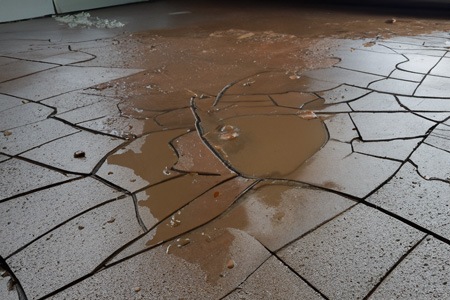
If you have waterlogged soil around the house, gravity suggests it eventually works its way to the lowest point. As the water table rises and the ground becomes saturated and muddy, it increases pressure on the floor and walls, making it easier for water to find its way through cracks in the walls and the basement floor.
Problems with the Backwater Valve
Another issue causing a leaking basement floor is a broken or stuck backwater valve. The backwater valve has the task of pushing the wastewater from the plumbing system into the sewer system. If there is a problem with the backwater valve, you'll notice the water smells bad. You'll need to fix this issue quickly, as grey water filling the basement can spread mold and disease fast.
Clogged Drains
A clogged and blocked drain is one of the primary reasons for finding water in the basement that isn't seeping in through a crack in the floor. A clogged drain means the water has nowhere to go and backs up into the house.
Leaking Pipes, or Appliances
If there's no crack in the basement floor, you should check the water heater tank to see if it's leaking. Most homes have the water heater in the basement, and they're prone to leaks when they reach the end of their service life. You'll need an effective water drainage system for the heater dispersing any leaks into a drain instead of out onto the floor.
The area around the furnace also requires inspection, as does any appliances like freezers or fridges. The pipework in the basement can also be responsible for leaks, causing water to pool on the basement floor. If you were hanging pictures on the walls, you might have driven a nail or screw through the wall, penetrating a pipe and causing a leak.
How Do I Stop a Leaky Basement Floor?
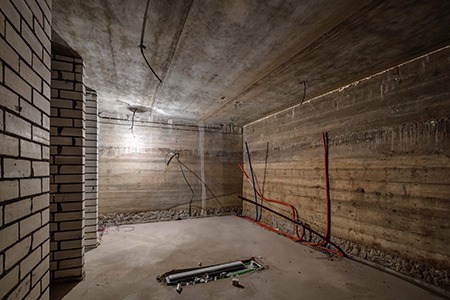
So, how do you stop the basement floor from leaking? There are a few strategies to prevent leaks from coming through the basement floor. If you're sure it's not a leaking appliance or water heater, you'll likely have an issue with water seeping through the concrete floor into the basement, causing the problem.
Here are a few strategies to help you locate and fix the source of the problem.
Check the Pipes for Clogs
Go around the house and ensure you don't have any clogged pipes. You'll notice clogs in the basins and drains if the P-trap under the sink is dry – it might also be a sign of a problem with the plumbing roof vent being clogged, causing a pressure imbalance in the pipes.
If you have a clog and can't reach it, call a plumber, and they'll sort it out for you. Plumbers use a snake to remove any clogs, and they'll remove it, resolving the problem.
Inspect the Sump Pump
Check the sump pump and ensure it's working. It's common for them to stick and burn out. The sump pump can run too often and burn out, too. If that happens, it won't move water away from the foundations and basement floor, resulting in a leak. The sump pump removes water from the weeping tiles; if it burns out, there's nothing to carry the water away.
In some instances, the power might fail during a rainstorm. With no electricity powering the sump pump, it can't move the water away. As a result, water and hydrostatic pressure build around the foundations, eventually finding its way through the cracks in the leaking basement floor that aren't properly waterproofed.
Improve the Foundation Grade
If the water isn't running away from the house efficiently, you'll need to check the grade to ensure you have enough slope for the water to run away from the foundations and basement walls. If you notice the water turning back to the house, chances are you have a problem with the grade in that area and need to address the issue.
Install a Drainage System
The idea behind improving the drainage around your home is to minimize the accumulation of water and the hydrostatic pressure it creates on the foundation and basement walls. If your home doesn't have a weeping tile, get a contractor to build one and install a sump pump. French drain alternatives, rock drainage ditches, and french drain themselves can all help tremendously.
They dig out the sump pump pit and fit the pump to push the water away from your home as the pit fills. The contractor might also recommend adding an interior drainage system to the wall. The drain runs along the wall where the floor joint meets the wall. The system gathers the water, draining it to a pump that pushes it away from the foundations and walls.
FAQs Regarding a Basement Floor Leaking
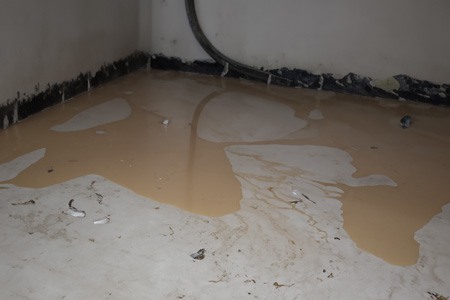
When the topic of water on a basement floor comes up, there’s always a handful of other questions that arise. Let’s cover those now.
Can I Live With a Leaky Basement Floor in My Home?
No. A leaky basement eventually leads to flooding. If you don't fix the problem, it won't go away by itself; it only worsens. If the area starts to flood, it can rot wood and damage anything you store in the basement.
Does a Leaky Basement Floor Cause Mold Growth?
A leaky presents the ideal breeding ground for mold spores that infest the home and damage your health. You need to take care of the leak immediately to prevent mold growth. Mold can infest an area and spread in as little as 48 hours.
Do I Need a Plumber to Fix a Leaking Basement Floor?
In some instances, you can repair minor cracks yourself if you know what you're doing. However, for severe cracks in the basement floor, you'll need assistance from a professional to resolve the problem. Get a few quotes from local contractors and go with the best deal on the repair. Ensure the contractor provides a guarantee on their work.
Does Homeowners Insurance Cover a Leaking Basement Floor?
Your homeowner's insurance may cover the leak; it depends on its origin. Typically, homeowners insurance won't cover repairs caused by a buildup of hydrostatic water pressure from an external source.
Can Water Come Up Through a Concrete Basement Floor?
Yes. You can experience a concrete floor sweating condensation, have water seeping through basement floor cracks from the soil beneath, and many other issues that can result a basement floor leaking in general.
Key Takeaways for Water Coming From the Basement Floor
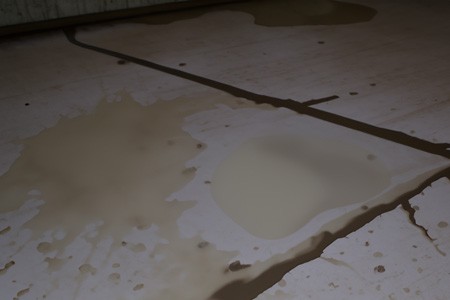
- The primary cause of a leaking basement floor is a crack in the flooring and bad waterproofing under the basement floor.
- Water rises through the crack due to increased hydrostatic water pressure as the water table rises.
- You'll probably notice that the problem occurs after heavy rains or snow melts.
- There are several other reasons causing water to pool through cracks. There might be no weeping tile or sump pump on the property.
- Or the leak could come from an appliance in the basement or the water heater.
Say Goodbye to Your Leaking Basement Floor
Above, we’ve described nearly every possible reason you could be dealing with a leaking basement floor. You may learn how to fix water coming through a basement floor in many of these cases, but some of them may require help from a professional. Don’t hesitate to reach out to one, even if you just hate to incur the cost. We all hate it but the sooner you fix it the better. Best of luck.



